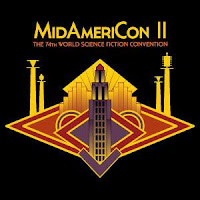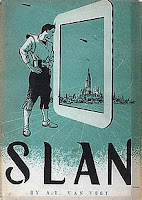 |
| Activist fan Chris M. Barkley at the 2015 Hugo Awards (Photo by Olav Rokne) |
Probably best known for his entertaining and personable columns that appear on File 770, Barclay has also written for Locus, Amazing Stories, the SFWA Blog, fanzines such as Argentus and Journey Planet, and numerous convention publications. It’s for this last category of fan writing that we feel Barkley has earned serious consideration for a Hugo Award, and in particular why we would urge you to include his name on your nominating ballots.
One key reason why 2021 has been such an impressive year for Barkley is his long-form work “Fantasy & Science Fiction Media Relations – Press Room Guide” published in August 2021. It’s a resource that should be distributed as widely as possible, to as many convention runners as possible. This thorough and detailed guide to the ups and downs, opportunities and pitfalls of media relations will help future conventions and convention-goers succeed. It’s a resource to use during both preparation and when facing a crisis.
As someone who has headed up the media office at five Worldcons (and staffed 14 others), Barkley has a depth of experience to draw on. It should be noted that this guide is roughly the length of a short novelette, and probably on its own has a word count equivalent to some fan writer finalists’ entire annual output.
Bolstering the case for nominating Barkley are this year’s crop of his “So Glad You (Didn’t) Ask” columns. Having sometimes described himself as an “activist fan,” it should be no surprise that Barkley can often be found agitating for tweaks to the rules that he suggests would make conventions more equitable and inclusive. Case in point, “So Glad You (Didn’t) Ask” number 57, which lays out five proposals on how to ensure the survival of fandom.
Over the years, Barkley has affected real change through his work. He’s often commended for helping to split Best Dramatic Presentation into short form and long form, and for leading the charge to split Best Editor into short form and long form (though with typical modesty, he always offers credit to others). He worked tirelessly to create a Hugo for best Young Adult novel and was an important voice in helping create a Best Graphic Story Award, and co-sponsored the creation of Best Fancast. It could be argued that few people have ever had as much of an impact on the Hugo Award categories.
In retrospect, Barkley has shown a remarkable amount of foresight. He warned in 2004 (a full decade before it happened) that there was the possibility that a slate of politically motivated malcontents might attempt to disrupt the Hugos. This was followed by his urging in 2013 that “The only way traditions like the Worldcon and Hugos will have any future is if the people who are interested and feel frozen out of the process continue to provide civil and constructive criticism and stay involved in fandom … What we need is MORE dissent, MORE thinking outside the box and MORE diversity in fandom, not less.”
The first time the editors of this blog encountered Chris M. Barkley, we were volunteering as photographers for the 2015 Hugo Awards ceremony. For years after, we assumed that he had received a Hugo Award nomination for his blogging, and this seemed like a reasonable assumption to make: his work is consistently good, he writes about fannish activities, and he’s well known in the community.
It was to our great surprise when we learned that he has never been on the Hugo Award ballot as a fan writer. It’s time to rectify that oversight, and 2022 should be his year.










